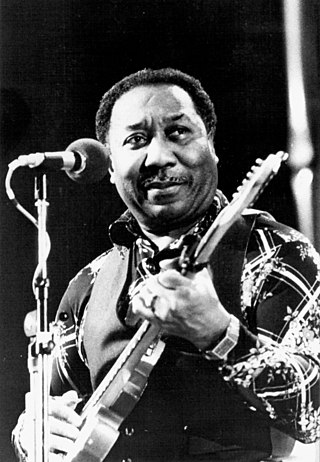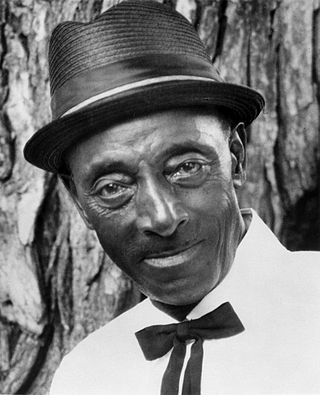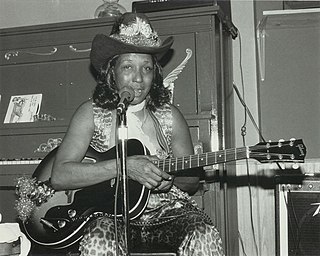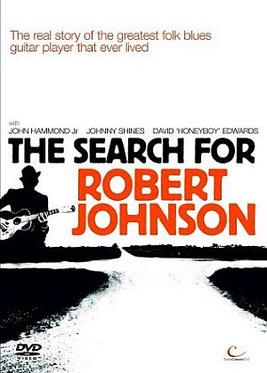Related Research Articles

John Lee Hooker was an American blues singer, songwriter, and guitarist. The son of a sharecropper, he rose to prominence performing an electric guitar-style adaptation of Delta blues that he developed in Detroit. Hooker often incorporated other elements, including talking blues and early North Mississippi hill country blues. He developed his own driving-rhythm boogie style, distinct from the 1930s–1940s piano-derived boogie-woogie. Hooker was ranked 35 in Rolling Stone's 2015 list of 100 greatest guitarists, and has been cited as one of the greatest male blues vocalists of all time.

Robert Leroy Johnson was an American blues musician and songwriter. His landmark recordings in 1936 and 1937 display a combination of singing, guitar skills, and songwriting talent that has influenced later generations of musicians. Although his recording career spanned only seven months, he is recognized as a master of the blues, particularly the Delta blues style, and as one of the most influential musicians of the 20th century. The Rock and Roll Hall of Fame describes him as perhaps "the first ever rock star".

McKinley Morganfield, known professionally as Muddy Waters, was an American blues singer and musician who was an important figure in the post-World War II blues scene, and is often cited as the "father of modern Chicago blues". His style of playing has been described as "raining down Delta beatitude".

Clarksdale is a city in and the county seat of Coahoma County, Mississippi, United States. It is located along the Sunflower River. Clarksdale is named after John Clark, a settler who founded the city in the mid-19th century when he established a timber mill and business. Clarksdale is in the Mississippi Delta region and is an agricultural and trading center. Many African-American musicians developed the blues here, and took this original American music with them to Chicago and other northern cities during the Great Migration.

Delta blues is one of the earliest-known styles of blues. It originated in the Mississippi Delta and is regarded as a regional variant of country blues. Guitar and harmonica are its dominant instruments; slide guitar is a hallmark of the style. Vocal styles in Delta blues range from introspective and soulful to passionate and fiery.

Nehemiah Curtis "Skip" James was an American Delta blues singer, guitarist, pianist and songwriter. AllMusic stated: "Coupling an oddball guitar tuning set against eerie, falsetto vocals, James' early recordings could make the hair stand up on the back of your neck."

Fred McDowell, known by his stage name Mississippi Fred McDowell, was an American singer, songwriter and guitarist.

Robert Lockwood Jr. was an American Delta blues guitarist, who recorded for Chess Records and other Chicago labels in the 1950s and 1960s. He was the only guitarist to have learned to play directly from Robert Johnson. Robert Lockwood was one of the first professional black entertainers to appear on radio in the South, on the King Biscuit Time radio show. Lockwood is known for his longtime collaboration with Sonny Boy Williamson II and for his work in the mid-1950s with Little Walter.

Charlie Patton, more often spelled Charley Patton, was an American Delta blues musician and songwriter. Considered by many to be the "Father of the Delta Blues", he created an enduring body of American music and inspired most Delta blues musicians. The musicologist Robert Palmer considered him one of the most important American musicians of the twentieth century.

R. L. Burnside was an American blues singer, songwriter and guitarist. He played music for much of his life but received little recognition before the early 1990s. In the latter half of that decade, Burnside recorded and toured with Jon Spencer, garnering crossover appeal and introducing his music to a new fan base in the punk and garage rock scenes.

David "Honeyboy" Edwards was an American delta blues guitarist and singer from Mississippi.
Robert Franklin Palmer Jr. was an American writer, musicologist, clarinetist, saxophonist, and blues producer. He is best known for his non-fictional writing on the field of music; his work as a music journalist for The New York Times and Rolling Stone magazine; his production work for blues recordings ; and his clarinet playing as a member of the 1960s jazz band, the Insect Trust.

Jessie Mae Hemphill was an American electric guitarist, songwriter, and vocalist specializing in the North Mississippi hill country blues traditions of her family and regional heritage.

Jack N. Johnson, known as Big Jack Johnson was an American electric blues musician, one of the "present-day exponents of an edgier, electrified version of the raw, uncut Delta blues sound." He was one of a small number of blues musicians who played the mandolin. He won a W. C. Handy Award in 2003 for best acoustic blues album.

David "Junior" Kimbrough was an American blues musician. His best-known works are "Keep Your Hands off Her" and "All Night Long". In 2023, he was inducted in the Blues Hall of Fame.

Kenny Brown is an American blues slide guitarist skilled in the North Mississippi Hill Country blues style.
Robert Mugge is an American documentary film maker. He has focused primarily on films about music and musicians, but some of his earliest films were not music focused and he is now continuing to branch out as his interests and work evolve.

The Search for Robert Johnson is a 1992 British television documentary film about the American Delta blues musician Robert Johnson, hosted by John Hammond, and produced and directed by Chris Hunt. In the film, Hammond journeys through the American Deep South to pursue topics such as Johnson's birth date, place and parents, his early musical development, performances and travels, romances, his mythic "pact with the devil," his death in the late 1930s, the discovery of possible offspring, and the uncertainty over where Johnson is buried. Throughout, Johnson's music is both foreground and background, from recordings of Johnson and as performed on camera by Hammond, David "Honeyboy" Edwards, and Johnny Shines.
Hill country blues is a regional style of country blues. It is characterized by a strong emphasis on rhythm and percussion, steady guitar riffs, few chord changes, unconventional song structures, and heavy emphasis on the "groove", which has been characterized as the "hypnotic boogie".
References
- 1 2 3 4 Halverson, Mark (2000). "Deep Blues review - the movie (DVD)". Blues on Stage.
- 1 2 Bradley Bambarger (2000-01-08). "WinStar brings back 'Deep Blues'". Billboard– via Google Books.
- ↑ John Sinclair (1993). "Robert Palmer: Site-Specific Music". Johnsinclair.us. Archived from the original on June 26, 2015. Retrieved June 24, 2015.
- ↑ Steve Cheseborough (2008). Blues Traveling: The Holy Sites of Delta Blues. Univ. Press of Mississippi. p. 92. ISBN 978-1-60473-328-0.
- ↑ Deep Blues at IMDb